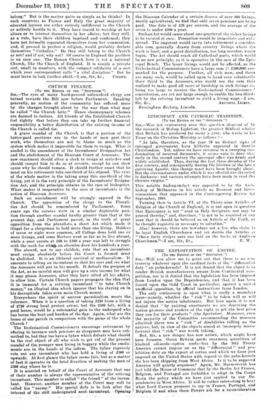EPISCOPACY AND CATHOLIC TRADITION. [To THE EDITOR OF THE " SPECTATOR.")
Sra,—Was not controversy over this question disposed of by the research of Bishop Lightfoot, the greatest Biblical schohir that Britain has produced for many a year, who wrote in his Essay on the Christian Ministry as follows ?
"As late, therefore, as the year 70 no distinct signs of episcopal government have hitherto appeared in Gent-lie Christendom. Yet, unless we have recourse to a sweeping condemnation of received documents, it seems vain to deny th.):: early in the second century the episcopal office was firmly and widely established. Thus, during the last three decades of the first century, and consequently during the lifetime of the late,t surviving Apostle, this change must have been brought about. But the circumstances under which it was effected are shrouded in darkness : and various attempts have been made to read ths obscure enigma."
This notable finding-in-fact was appealed to by the A reitbishop of Melbourne in his article on Reunion and latercommunion that appeared in the Contemporary Review for September, 1903. .
Turning 'then to Article VI. of the Thirty-nine Articles of Religion of the Church of England, it is not open to question that Episcopacy is not " read in Holy Scripture, nor may be proved thereby," and, therefore, "is not to be required of any man that it should be believed as an Article of the Faith, or be thought requisite or necessary to salvation."
Alas! however, there are nowadays not a few who claim to be loyal English Churchmen and yet deride the Articles as "those forty stripes save one laid on the backs of Anglican Churchmen."—I am, Sir, &c., R. W.


















































 Previous page
Previous page